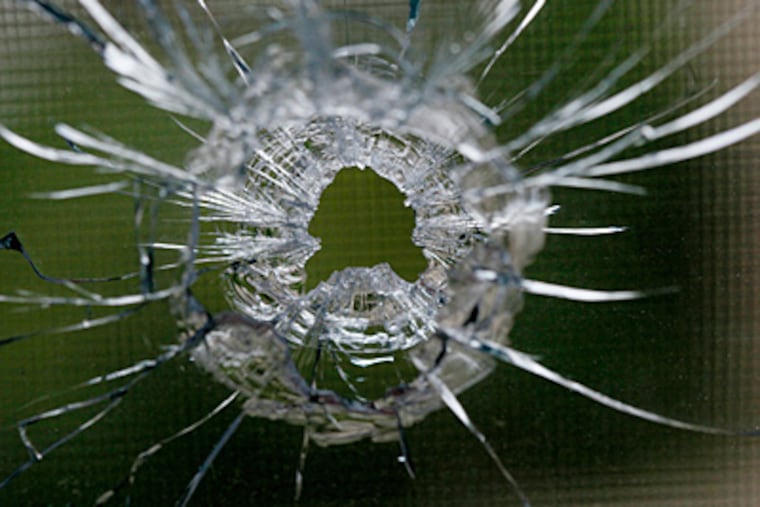
I asked her where she wanna be when she 25.
She turned around and looked at me and said "alive."
- Jay-Z and Kanye West, "Welcome to the Jungle"
Sometimes when I park my car at St. Christopher's Hospital for Children and head inside, I can see the first signs that a heartbreaking event is unfolding - a cluster of news vans with their identifying logos: Fox TV, Action News, CBS Philly. Usually there is a direct correlation between the number of vans and the depth of a tragedy that is affecting our community, our families, our kids.
On those days, there is usually a palpable increase in the energy of the night staff walking past me, as they hastily make their way home to hug their children a little tighter, connect with their partners a little more intensely.
The signs continue to unfold in our lobby, busy for so early in the day. I look at the stack of newspapers at our security desk, and sometimes the answer is right on the front page. Sometimes it's buried inside the paper, the wounds in our community too recent to make the morning edition.
More than half of all deaths in Philadelphia are from heart disease and cancer, but these deaths rarely make the news. Many are adult diseases that originate with habits begun in childhood - unhealthy diets, teen smoking, unsafe sex; and continuous traumatic stress.
What makes news is when it's a 3-month-old found unresponsive in his parents' bed, a 5-year-old mauled by a neighbor's pit bull, siblings trapped inside a fiery rowhouse, or a group of teens gunned down before reaching the future that high school graduation promises. These events reverse the natural order of things.
The specter of death and disability surrounds way too many of our children who live in concentrated areas of poverty. A 2001 study of children my son's age - 7 years - who live around our hospital found rampant exposure to violence. Seventy-five percent had heard gunshots, 61 percent worried they might get killed, 10 percent had seen a shooting or stabbing inside the home, and an unbelievable 18 percent had seen a dead body outside.
These are 7-year-olds.
In our country, infant-mortality rates (rates of deaths before a child's first birthday) are abysmal, ranking 34th, between Malta and Cuba, according to the United Nations. In Philadelphia, the death toll is much more dire. In Philadelphia, the infant-mortality rate in 2007 was 11.4 deaths per 1,000 live births, compared with Pennsylvania's rate of 7.4, and a U.S. rate of 6.8. The rate among blacks in Philadelphia was 15.9, close to twice that of whites, Asians, and Latinos. Philadelphia's rate is close to double those of New York and Los Angeles.
For infants in Philadelphia, two of the most common causes of death are prematurity and SIDS (sudden infant death syndrome). For teens, homicide kills the most. For children between those two age groups, unintentional injuries, such as motor-vehicle accidents, take their greatest toll.
Besides giving immunizations and monitoring a child's growth and development, a pediatrician offers guidance on nutrition, developmental progress, and safety. But when concentrated areas of poverty, such as those surrounding our hospital, are ravaged by such high rates of death and disability, we must adjust our guidance to the needs of our community, the needs of the 7-year-olds bearing witness.
We know the risks. Teen parenting, accumulated life stressors embedded in a mother's genes, insufficient prenatal care, smoking, and food insecurity are risk factors for both prematurity and SIDS. Corporal punishment, domestic violence, child abuse, bullying, truancy, lack of role models, and hopelessness are all risk factors for homicide. They make homicide predictable, but it's also preventable.
We as health-care providers, public-health professionals, teachers, and parents need to act to decrease these risks. We must support programs such as the Department of Public Health's Get Healthy Philly programs that provide positive, sustainable health change in communities. We need to support programs such as the Maternity Care Coalition's (www.momobile.org) efforts to improve infant health outcomes and reduce the risk of SIDS in high-risk communities. We need to provide hope to children through after-school and mentoring through programs such as the one I help run, www.cap4kids.org/philadelphia. We need to help our children see their potential beyond age 25.
As I walk back to my car after a busy day talking with families and staff about safety and risk reduction, I see one of my school-age clinic patients walking toward me, smiling ear to ear. We exchange a quick high-five and hug. I look over his shoulder, toward the front of our hospital, and see the last of the news vans scatter away - a moment of peace, until the start of the next news cycle.